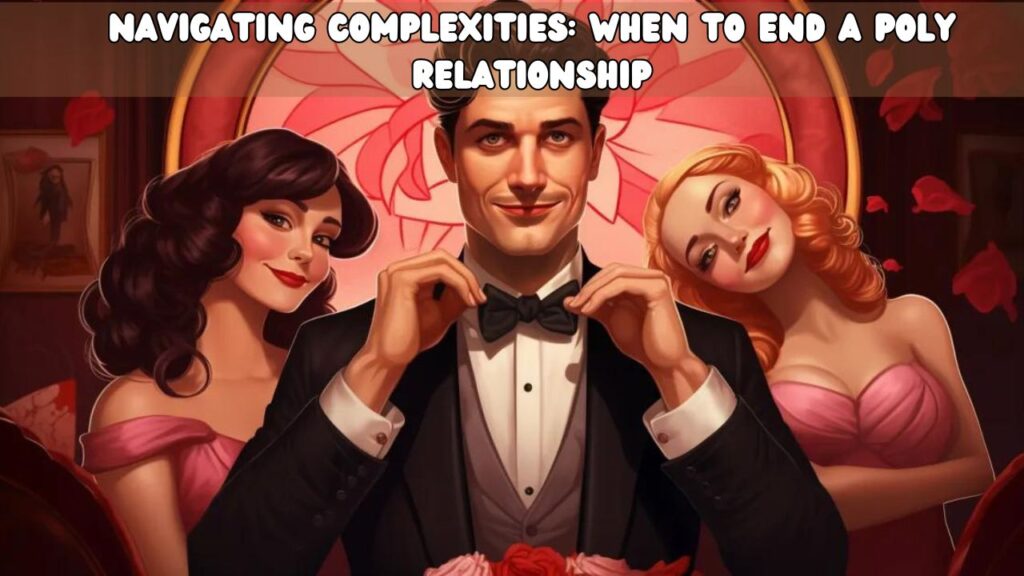Message to Dr. Hart
From: Alex
Age: 29
Partners: 31 & 27
Duration: 3 years
From: Australia
Hi Dr. Hart,
I’m Alex, 29, from Australia. I’ve been in a polyamorous relationship with my partners, who are 31 and 27, for about three years. Lately, I’ve been feeling disconnected and uncertain about our future together. Could you provide some advice on when to end a poly relationship and how to approach this situation?
Dr. Seraphina Hart’s Response:
Dear Alex,
Navigating the dynamics of a polyamorous relationship can indeed be complex and challenging. It involves a unique set of understandings, emotions, and commitments that can be quite different from monogamous relationships. It’s crucial to approach such matters with care, understanding, and, above all, honesty – both with yourself and with your partners. Let’s delve deeper into the signs that might indicate it’s time to reconsider your involvement in a poly relationship and how to responsibly address these feelings.
Recognizing When to End a Poly Relationship

In polyamorous relationships, just like in any other form of relationship, certain foundational elements are crucial for its health and longevity. These elements include open communication, mutual respect, and shared values. When these are missing, or if certain issues persist despite efforts to resolve them, it may be time to reassess your involvement.
Loss of Connection or Fulfillment
Feeling a consistent sense of disconnection or a lack of fulfillment in a polyamorous relationship is a significant concern. Let’s break this down further:
- Evaluating Emotional Connection: In poly relationships, where you’re dealing with multiple emotional connections, it’s essential to feel valued and connected in each of those relationships. If you find yourself consistently feeling detached or emotionally distant from one or all of your partners, it’s important to acknowledge these feelings.
- Seeking Joy and Fulfillment: Relationships should bring joy, growth, and fulfillment. If your poly relationship consistently feels draining or unfulfilling, it may be an indication that your needs and desires are not being met. This lack of fulfillment could be emotional, physical, or intellectual.
Imbalance in Emotional Investment
The balance of emotional investment in a poly relationship is a delicate and crucial aspect. Here’s why it matters:
- Assessing Commitment Levels: In a healthy poly relationship, all parties involved should ideally feel equally committed and invested. This doesn’t necessarily mean equal time spent with each partner but rather an equal sense of commitment, care, and respect.
- Recognizing Imbalance: If you find that this balance is consistently off – maybe one partner is more invested than the others, or there’s a feeling of being taken for granted – it could be a sign that the relationship dynamics need reevaluation. An imbalance in emotional investment can lead to feelings of resentment, neglect, or loneliness.
Alex, recognizing and acknowledging these signs is the first step in addressing any issues in your polyamorous relationship. It requires a lot of introspection and honest communication with your partners. Remember, every relationship, polyamorous or otherwise, should enhance your life and happiness. If you find that this is no longer the case, it might be time to consider a change.
Addressing Challenges in a Poly Relationship

In a polyamorous relationship, where the dynamics are inherently more complex due to the involvement of multiple partners, addressing challenges effectively is key to maintaining a healthy and satisfying connection for everyone involved.
Communication Breakdowns
Effective communication is the bedrock of any relationship, and in a poly dynamic, its importance is magnified. Let’s delve into why communication breakdowns can be particularly concerning in polyamorous relationships:
- Complexity of Needs and Boundaries: With multiple partners, there’s a diverse array of needs, boundaries, and expectations to consider and respect. This complexity requires clear, consistent, and honest communication. Each partner’s ability to express their needs and listen to others is crucial.
- Recognizing Persistent Issues: If you find that efforts to improve communication consistently fail, it could be a significant red flag. It might indicate deeper relational problems that are not being adequately addressed or acknowledged. This could include unresolved conflicts, unmet emotional needs, or even fundamental misunderstandings.
- Impact on Relationship Dynamics: Persistent communication issues can lead to a build-up of resentment, misunderstandings, and emotional distance. In poly relationships, this can create a domino effect, impacting not just one dyad within the relationship but the entire network.
Incompatible Goals or Values
As individuals grow and evolve, so do their goals and values. This evolution can sometimes lead to a misalignment in a polyamorous relationship:
- Assessing Long-Term Aspirations: It’s important to periodically assess whether your long-term goals and aspirations still align with those of your partners. In poly relationships, this might involve considerations around living arrangements, financial goals, family planning, or even how the relationship is structured.
- Evaluating Core Values: Similarly, fundamental values – those guiding principles that shape your life decisions and sense of self – need to be in harmony. If there’s a significant shift in core values that leads to misalignment, it can create friction and dissatisfaction.
- Reflecting on Relationship Viability: When long-term goals or fundamental values no longer align, it’s essential to reflect on the viability of the relationship. This is not about assigning blame but rather acknowledging that people can change, and what once was a harmonious relationship may no longer be so.
- Considering Individual and Collective Needs: It’s important to consider whether staying in the relationship serves the needs and happiness of all involved. This involves a delicate balance between individual contentment and the well-being of the relationship as a whole.
Alex, addressing challenges in a poly relationship requires a nuanced understanding of each partner’s needs and an ongoing commitment to honest and open dialogue. When communication breakdowns persist or when there’s a significant misalignment in goals or values, it might be time to reassess the relationship. This reevaluation should be approached with compassion, understanding, and respect for the feelings of all parties involved.
Approaching the Decision with Care

Deciding whether to stay in or leave a polyamorous relationship is a significant and often difficult decision. It requires deep introspection and open, honest communication with your partners. Approaching this decision with care and thoughtfulness is crucial for the well-being of all involved.
Self-Reflection
Self-reflection is a vital step in making informed and authentic decisions about your relationships.
- Understanding Your Needs: Take time to deeply consider what you want and need in a relationship. Are you seeking emotional support, intellectual stimulation, shared activities, or something else? Assess whether these needs are currently being met in your polyamorous arrangement.
- Reflecting on Your Motivations: Be honest with yourself about why you entered into the relationship. Was it for companionship, love, exploration, or other reasons? Understanding your initial motivations can provide insight into what you’re seeking now and whether those reasons still hold true.
- Evaluating Current Satisfaction: Reflect on your current level of satisfaction in the relationship. Consider aspects like emotional fulfillment, the quality of communication, and your sense of connection to each partner.
- Identifying Changes: Acknowledge any changes in your feelings or circumstances since the relationship began. Changes in life goals, personal values, or emotional needs can all impact your satisfaction in a relationship.
Open and Honest Dialogue
Having an open and honest conversation with your partners is critical to navigating polyamorous relationships, especially when considering ending one.
- Choosing the Right Time and Setting: Select a time and place where all parties can speak without interruptions. Ensure that everyone is in a calm and receptive state of mind.
- Sharing Your Feelings: Communicate your feelings clearly and respectfully. Use “I” statements to express how you feel rather than making accusatory statements. For example, say “I feel overwhelmed when…” instead of “You always make me feel…”
- Listening Actively: Be prepared to listen to your partners’ perspectives and feelings. Active listening involves fully concentrating on what is being said, understanding it, and responding thoughtfully.
- Discussing Concerns: Share any concerns you have about the relationship. This could include feelings of neglect, imbalances in time or emotional investment, or concerns about the future of the relationship.
- Empathetic Approach: Approach the conversation with empathy. Understand that this discussion may be challenging for your partners as well. Avoid placing blame and focus on expressing your own experiences and feelings.
Alex, approaching the decision to end a polyamorous relationship with careful self-reflection and open, honest dialogue is vital. It allows you to understand your own needs and perspectives better and also provides a platform for your partners to share theirs. This approach ensures that any decision made is respectful, thoughtful, and considers the well-being of everyone involved.
Moving Forward

Making the decision to end a relationship, especially a polyamorous one with its intricacies and deep emotional connections, is never easy. However, moving forward with clarity, respect, and support is essential for the emotional health of everyone involved.
Ending Things Respectfully
Ending a relationship with grace and respect is crucial, particularly in a polyamorous context where multiple emotional bonds are at play.
- Communicate Clearly and Kindly: When you’ve made the decision to end the relationship, communicate this to your partners clearly and kindly. Choose your words carefully, ensuring they reflect respect and appreciation for the time you’ve spent together.
- Respecting Emotions: Be prepared for a range of emotions from your partners. Ending a relationship can elicit feelings of sadness, anger, or confusion. It’s important to allow space for these emotions while maintaining your boundaries.
- Discussing Logistics: In a poly relationship, there might be logistical considerations such as shared living spaces, belongings, or mutual social circles. Discuss these practicalities with empathy and fairness.
- Closure and Healing: Offer and ask for closure if needed. A final conversation to acknowledge the end of the relationship can be an important step in the healing process for everyone.
Seeking Support
The end of a relationship is a significant life change and seeking support can be beneficial.
- Friends and Family: Lean on friends and family for emotional support. They can offer a listening ear, advice, or simply a distraction when you need it.
- Professional Help: Consider seeking support from a therapist, especially one who is experienced in dealing with polyamorous relationships. They can provide guidance and tools to help you navigate your emotions and the changes in your life.
- Support Groups: There are support groups and communities for people who have experienced the end of polyamorous relationships. These can be invaluable resources for sharing your experiences and learning from others who have been through similar situations.
- Self-Care: Prioritize self-care. This can include activities that you enjoy, exercise, mindfulness practices, or simply giving yourself time to reflect and heal.
Alex, remember that relationships, whether monogamous or polyamorous, are about mutual fulfillment and happiness. Trusting your feelings and ensuring that your decisions are in line with your emotional and mental well-being is essential. It’s okay to prioritize your happiness and health, and sometimes, moving forward means making tough decisions. Navigating this change with respect, kindness, and support will pave the way for healing and growth.
Warm regards,
Dr. Seraphina Hart, PhD
Dr. Seraphina Hart, PhD, is a relationship therapist with over two decades of experience in the field of psychology and human behavior. With a rich academic background from Stanford University, she has an in-depth understanding of the complexities of interpersonal relationships. Dr. Hart's journey began with a deep fascination with the human mind and how it forms emotional connections, leading her to specialize in relationship therapy.
Her compassionate approach and unique methodology are informed by her extensive study of various therapeutic modalities, including Cognitive Behavioral Therapy (CBT), Emotionally Focused Therapy (EFT), and mindfulness techniques. Dr. Hart believes in the power of empathy and understanding in healing and transforming relationships. With her guidance, clients learn to navigate their emotions, communicate effectively, and foster a deep sense of self-awareness.
- Dr. Harthttps://loveinteract.com/author/drhart/
- Dr. Harthttps://loveinteract.com/author/drhart/
- Dr. Harthttps://loveinteract.com/author/drhart/
- Dr. Harthttps://loveinteract.com/author/drhart/



You may like
How to Handle Your Partner’s Jealousy: 5 Practical Ways to Strengthen Trust and Maintain Your Freedom
Should I Marry Someone with Debt? Navigating Love, Money, and Future Together
Dealing with an Overbearing Mother-in-Law: How to Set Boundaries Without Harming Your Marriage